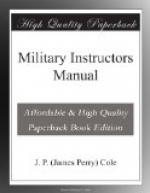1375. FURLOUGHED TO RESERVE or discharged, a soldier is given a final statement in duplicate. This must be presented to be valid.
1378. TRANSPORTATION and subsistence is allowed to the point of enlistment, or for the same distance. Not subject to deduction for debts due the United States.
1380. DISCHARGED SOLDIER under charge of fraudulent enlistment is not entitled to transportation and subsistence.
1383. TRANSFER OF CLAIMS on the government made by an enlisted man are only recognized after discharge or furlough to the reserve. They must be in writing and must be endorsed by a commissioned officer or other responsible person known to the quartermaster.
1437. No one is allowed to accompany sick or wounded from the battle line to the rear except those specifically authorized.
1530. Ammunition lost or used without orders or not in line of duty shall be charged to the soldier using it.
NOTES ON THE LAWS OF WAR.
(From Manual for Commanders of Infantry
Platoons, translated from
the French at
the Army War College, 1917. War Department
Document No. 626.)
The laws of war were instituted under the generous error that certain well-organized peoples had entirely emerged from barbarism and that they considered themselves bound by the placing of their signatures to international conventions, freely agreed to.
An infinite number of acts minutely and officially investigated have established that our troops and our Nation should never count on the observance of these laws and that the atrocities committed prove to be not only individual violations dishonoring merely the perpetrator, but violations premeditated and ordered in cold blood by the commanders with the moral support of the heads of the enemy nation.
These laws are nevertheless repeated here in order that:
1. The knowledge of how the war should have been conducted may develop in the heart of each man the sentiment of hate (applicable only to foes such as we actually have), that in no case should a chief of platoon tolerate any intercourse between his men and the enemy other than that of the rifle; this duty is explicit and not to be departed from except in the case of the wounded and prisoners incapable of doing harm.
2. That every violator of these laws, taken in the act, shall be the subject of an immediate report with witnesses, then sent to the division headquarters to be tried as to the facts of the case.
The laws of war resulted from the Geneva convention, from the declaration of St. Petersburg (Petrograd), and from the different Hague conventions. All these diplomatic papers were signed by Germany, Austria-Hungary, Turkey and Bulgaria.
The following are the principal articles:
Protect the wounded on the field of battle from pillage and from bad treatment; respect ambulances and evacuation convoys; respect the personnel exclusively concerned with the transportation, treatment and guarding of wounded; do not treat this personnel as prisoners of war if it falls into the hands of the enemy; but return such personnel, as well as material, when its retention shall be no longer necessary for the care of the wounded prisoners.




